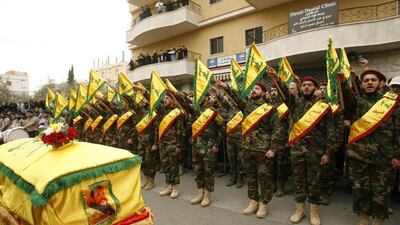French courts heard evidence of a vast international money laundering and drug smuggling operation run by suspects linked to Hezbollah that stretched across four continents.
The network was busted in a wave of arrests in 2016 and the hearings in Paris are laid bare a global network that handled tens of millions of dollars in narcotics, luxury contraband and smuggled goods.
A total of 15 defendants linked to the Lebanese diaspora, including Mohamed Noureddine, 44, the suspected operations chief and a designated as a member of Hezbollah by the US Treasury.
Prosecutors have amassed evidence that the group handled the vast sums generated from smuggling drugs on behalf of a Colombian drug cartel, run by the kingpin Joaquín “El Chapo” Guzmán, shipping large quantities of cocaine to Europe and the US.
Led by the US Drug Enforcement Agency, the investigation involved seven countries, including France, Germany, Italy and Belgium, from its launch in February 2015. In late January 2016 a co-ordinated series of arrests took place across all four countries. Mr Noureddine, who denies involvement in drug smuggling, was held at the French airport, Roissy.
French investigators have now pieced together a triple-tiered money laundering operation that involved buying luxury goods and even whole businesses to disguise the origins of the drug revenues.
Cash was dropped off at hairdressers in Antwerp in Belgium, a large hotel in Paris, a restaurant in Montreuil or a café in Enschede in the Netherlands. Transcripts showed that Mr Noureddine would hand out orders for the collection of as much as 500,000 euros at a time. Six figure sums were often delivered in small note denominations.
Among the colourful codes that the group used for its drop-offs was Mercedes 250, meaning of 250,000 euros, while "truck" was a tranche of one million euros. Meanwhile the destinations were also given codewords, including the "oven" for the Netherlands, and the "mill" for Belgium.
Read more:
Drugs, diamonds and used cars: the Hezbollah network the US destroyed
US Justice Department designates Hezbollah ‘transnational crime organisation’
_______________
Outposts ranged from Singapore to Coliombia, via the Middle East. The informal banking arrangements in Hawala networks was often used to shift the money across borders including to the drug gangs of Colombia. American investigations also compiled evidence of an import and export trade in luxury vehicles, including Porsche, BMW or Range Rover, that were shipped to West Africa, Lebanon or Dubai.
Dealerships involved in this network occupied some of the most prestigious sites in France, including the Arc de Triomphe showroom in Paris. Hundreds of thousands of euros was paid for merchandise at leading jewellers for the easily transportable and expensive watches of Rolex and Patek Philippe.
The main destination for the luxury products was Beirut airport, where the head of intelligence was known contact of the group, according to the DEA. It also alleges that part of the money was used to procure weapons used by Hezbollah units in Syria.
Funds returned to the Colombians was funnelled through Lebanon-based Chams Exchange, a foreign exchange dealer active around the world.
The main movers in the money and luxury goods operations were Noureddine, an associate named Abbas Nasser and Mohamad Ali Chour, who was in 2016 at Abidjan airport in West Africa carrying $1.7 million said to be destined for Hezbollah’s local operation.
The nexus was ultimately run by a man called Mohammad Ammar from a prominent Lebanese family who was arrested in Florida in early 2016 while travelling from his home in Medellin, Colombia.
Matthew Levitt, an expert on Hezbollah's financial operations, has said the arrests in 2016 were among the most significant breakthroughs against its lucrative links to drugs and money laundering ever seen.
"This was no rogue operation but, rather, a function of Hezbollah’s “financial apparatus,” which “maintained direct ties” to both Hezbollah commercial and terrorist elements," he wrote in a report published by the Washington Institute of the US Treasury designation of Nourheddine, which preceded the arrests. "Within days of this designation, Noureddine was arrested in France along with several other accused Hezbollah operatives.
"The arrests, it would turn out, were part of long-planned and well-executed law enforcement operation—Operation Cedar—of which the Treasury designation was just one part. Indeed, it was the extensive evidence of a Hezbollah transnational criminal enterprise, largely, but by no means only, operating out of Europe, that led to this massive international law enforcement operation targeting Hezbollah’s business affairs component activities in Europe."


